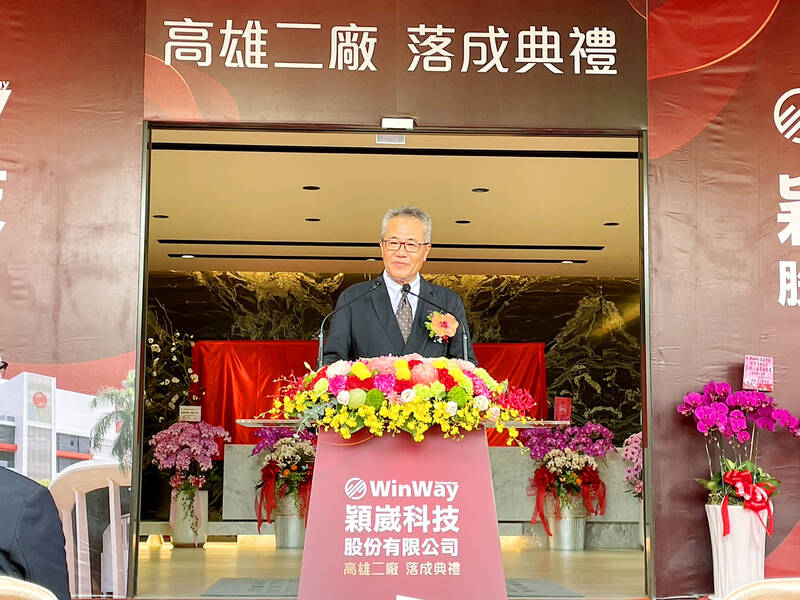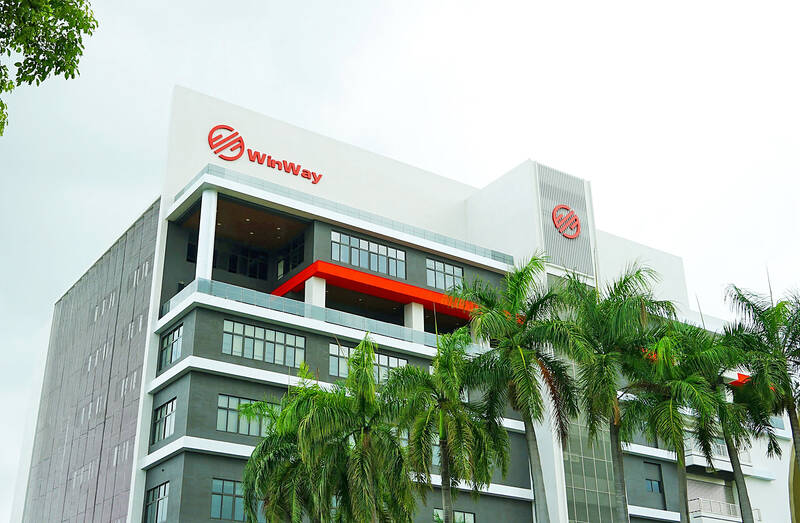WinWay Technology Co (穎崴) yesterday launched a new probe card factory in Kaohsiung which the IC testing interface supplier has spent NT$3.2 billion (US$104.17 million) on, as it seeks to expand capacity amid fast-growing testing demand primarily for artificial intelligence (AI), high-performance-computing (HPC) and auto chips.
The new factory would help satisfy customers’ demand for advanced process technologies, as well as high-speed and high-frequency testing services, the company said in a statement.
It is expected to generate an annual production value of NT$1 billion and create about 1,000 jobs in the nation’s second-largest city, WinWay said.

Photo: CNA
“The company decided to invest NT$3.25 billion on building a high-end semiconductor manufacturing facility at the Nanzih Technology Industrial Park (楠梓科技產業園區), as it believes rapid growth of 5G, AI, HPC and auto chips will give a strong boost to high-end testing services,” WinWay chairman Mark Wang (王嘉煌) said in the statement.
With the factory entering operations, WinWay aims to expand its probe card capacity to 3 million units a month within the next two years, which would raise its in-house probe card supply to 50 percent of total probes consumed by the firm.
The expansion of probe card capacity would enable the company to be well-prepared for growth opportunities from AI-related chips, Wang said.

Photo courtesy of the Kaohsiung Economic Development Bureau via CNA
Due to rapidly growing demand for generative AI applications, the production value of the global semiconductor industry would triple to US$125 billion in 2027, from US$53 billion this year, Morgan Stanley said in a report earlier this week.
WinWay counts AI chip suppliers Advanced Micro Devices Inc (AMD) and Nvidia Corp among its customers.
AMD yesterday launched its new MI300X chip for AI and is targeting mass production in the fourth quarter of this year.
WinWay is also expanding its probe card capacity at a facility in Hsinchu, Wang said, adding that it is expected to be completed by the end of this year.
WinWay expects its probe card revenue to double next year, thanks to the capacity expansion at its Kaohsiung and Hsinchu facilities, Wang said.
The company’s probe card business accounted for about 20 percent of its total revenue last year, company data showed.
WinWay’s revenue in the first five months totaled NT$1.64 billion, up 26.68 percent from the same period last year.
This year’s revenue is expected to be higher than last year’s NT$5.12 billion, fueled by new orders and a broader product lineup, the company said.

Taiwan Semiconductor Manufacturing Co (TSMC, 台積電) yesterday said that its investment plan in Arizona is going according to schedule, following a local media report claiming that the company is planning to break ground on its third wafer fab in the US in June. In a statement, TSMC said it does not comment on market speculation, but that its investments in Arizona are proceeding well. TSMC is investing more than US$65 billion in Arizona to build three advanced wafer fabs. The first one has started production using the 4-nanometer (nm) process, while the second one would start mass production using the

‘SILVER LINING’: Although the news caused TSMC to fall on the local market, an analyst said that as tariffs are not set to go into effect until April, there is still time for negotiations US President Donald Trump on Tuesday said that he would likely impose tariffs on semiconductor, automobile and pharmaceutical imports of about 25 percent, with an announcement coming as soon as April 2 in a move that would represent a dramatic widening of the US leader’s trade war. “I probably will tell you that on April 2, but it’ll be in the neighborhood of 25 percent,” Trump told reporters at his Mar-a-Lago club when asked about his plan for auto tariffs. Asked about similar levies on pharmaceutical drugs and semiconductors, the president said that “it’ll be 25 percent and higher, and it’ll

CHIP BOOM: Revenue for the semiconductor industry is set to reach US$1 trillion by 2032, opening up opportunities for the chip pacakging and testing company, it said ASE Technology Holding Co (日月光投控), the world’s largest provider of outsourced semiconductor assembly and test (OSAT) services, yesterday launched a new advanced manufacturing facility in Penang, Malaysia, aiming to meet growing demand for emerging technologies such as generative artificial intelligence (AI) applications. The US$300 million facility is a critical step in expanding ASE’s global footprint, offering an alternative for customers from the US, Europe, Japan, South Korea and China to assemble and test chips outside of Taiwan amid efforts to diversify supply chains. The plant, the company’s fifth in Malaysia, is part of a strategic expansion plan that would more than triple

Taiwanese artificial intelligence (AI) server makers are expected to make major investments in Texas in May after US President Donald Trump’s first 100 days in office and amid his rising tariff threats, Taiwan Electrical and Electronic Manufacturers’ Association (TEEMA, 台灣電子電機公會) chairman Richard Lee (李詩欽) said yesterday. The association led a delegation of seven AI server manufacturers to Washington, as well as the US states of California, Texas and New Mexico, to discuss land and tax issues, as Taiwanese firms speed up their production plans in the US with many of them seeing Texas as their top option for investment, Lee said. The